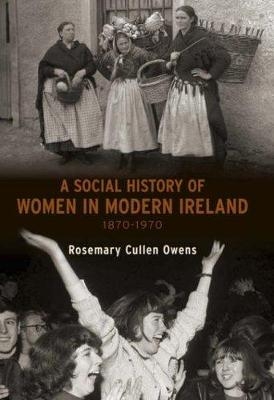
A Social History of Women in Ireland, 1870-1970
Seiten
2005
Gill & Macmillan Ltd (Verlag)
978-0-7171-3681-0 (ISBN)
Gill & Macmillan Ltd (Verlag)
978-0-7171-3681-0 (ISBN)
- Titel ist leider vergriffen;
keine Neuauflage - Artikel merken
A Social History of Women in Ireland explores the role and status of women in Ireland from 1870 until 1970 and fills an important gap in the literature of the period, touching as it does on politics, sociology, marriage patterns, religion, education and work.
Rosemary Cullen Owens stresses at all times the importance of class and land ownership as key determinants for women’s lives. A decrease in home industries allied to increasing mechanisation on the farm, resulted in a contraction of labour opportunities for rural women. With the establishment of an independent farming class, the distinguishing criteria for status in rural Ireland became ownership of land, in which single-minded patriarchal figures dominated. In this context, the position of women declined, and a society evolved with a high pattern of late-age marriages, large numbers of unwed sons and daughters, and an accepted pattern of emigration.
In the cities and towns, the condition of lower-working-class women was particularly distressing for most of the period, with particular problems regarding housing, health and sanitation. Through the working of campaigning activists, equal educational and political rights were eventually attained. From the early 1900s there was some expansion in female employment in shops, offices and industry, but domestic service remained a high source of employment. For middle-class women, employment opportunities were limited and usually disappeared on marriage. The civil service, a major employer in an economy that was generally un-dynamic and stagnant, operated a bar on married women for much of the period.
Rosemary Cullen Owens not merely traces these injustices but also the campaigns fought to right them. She locates these struggles in the wider social context in which they took place. This important and overdue book provides an important missing piece in the jigsaw of modern Irish history.
Rosemary Cullen Owens stresses at all times the importance of class and land ownership as key determinants for women’s lives. A decrease in home industries allied to increasing mechanisation on the farm, resulted in a contraction of labour opportunities for rural women. With the establishment of an independent farming class, the distinguishing criteria for status in rural Ireland became ownership of land, in which single-minded patriarchal figures dominated. In this context, the position of women declined, and a society evolved with a high pattern of late-age marriages, large numbers of unwed sons and daughters, and an accepted pattern of emigration.
In the cities and towns, the condition of lower-working-class women was particularly distressing for most of the period, with particular problems regarding housing, health and sanitation. Through the working of campaigning activists, equal educational and political rights were eventually attained. From the early 1900s there was some expansion in female employment in shops, offices and industry, but domestic service remained a high source of employment. For middle-class women, employment opportunities were limited and usually disappeared on marriage. The civil service, a major employer in an economy that was generally un-dynamic and stagnant, operated a bar on married women for much of the period.
Rosemary Cullen Owens not merely traces these injustices but also the campaigns fought to right them. She locates these struggles in the wider social context in which they took place. This important and overdue book provides an important missing piece in the jigsaw of modern Irish history.
Dr Rosemary Cullen Owens lectures in women’s history at the Women’s Studies Department, University College Dublin. Her publications include Smashing Times: A History of the Women’s Suffrage Movement 1889–1922 (1984), Louie Bennett, A Biography (2001) and A Social History of Women in Ireland, 1870–1970 (2005).
| Erscheint lt. Verlag | 25.10.2005 |
|---|---|
| Verlagsort | Dublin |
| Sprache | englisch |
| Maße | 157 x 239 mm |
| Gewicht | 818 g |
| Themenwelt | Geschichte ► Teilgebiete der Geschichte ► Kulturgeschichte |
| Geschichte ► Teilgebiete der Geschichte ► Sozialgeschichte | |
| Sozialwissenschaften ► Soziologie ► Gender Studies | |
| ISBN-10 | 0-7171-3681-7 / 0717136817 |
| ISBN-13 | 978-0-7171-3681-0 / 9780717136810 |
| Zustand | Neuware |
| Haben Sie eine Frage zum Produkt? |
Mehr entdecken
aus dem Bereich
aus dem Bereich
der stille Abschied vom bäuerlichen Leben in Deutschland
Buch | Hardcover (2023)
C.H.Beck (Verlag)
23,00 €
vom Mittelalter bis zur Gegenwart
Buch | Softcover (2024)
C.H.Beck (Verlag)
12,00 €
Die Revolution des Gemeinen Mannes
Buch | Softcover (2024)
C.H.Beck (Verlag)
12,00 €


